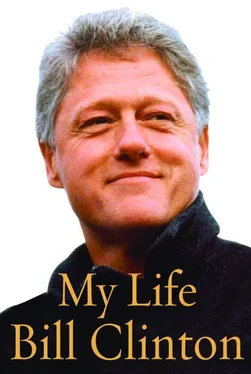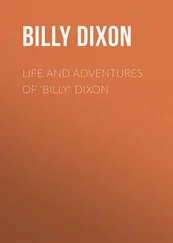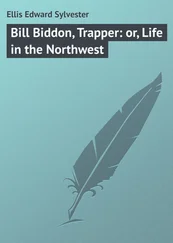After I became President, I got another firsthand account of my grandfather’s store. In 1997, an AfricanAmerican woman, Ernestine Campbell, did an interview for her hometown paper in Toledo, Ohio, about her grandfather buying groceries from Papaw “on account” and bringing her with him to the store. She said that she remembered playing with me, and that I was “the only white boy in that neighborhood who played with black kids.” Thanks to my grandfather, I didn’t know I was the only white kid who did that. Besides my grandfather’s store, my neighborhood provided my only other contact with people outside my family. I experienced a lot in those narrow confines. I saw a house burn down across the street and learned I was not the only person bad things happened to. I made friends with a boy who collected strange creatures, and once he invited me over to see his snake. He said it was in the closet. Then he opened the closet door, shoved me into the darkness, slammed the door shut, and told me I was in the dark alone with the snake. I wasn’t, thank goodness, but I was sure scared to death. I learned that what seems funny to the strong can be cruel and humiliating to the weak.
Our house was just a block away from a railroad underpass, which then was made of rough tar-coated timbers. I liked to climb on the timbers, listen to the trains rattle overhead, and wonder where they were going and whether I would ever go there.
And I used to play in the backyard with a boy whose yard adjoined mine. He lived with two beautiful sisters in a bigger, nicer house than ours. We used to sit on the grass for hours, throwing his knife in the ground and learning to make it stick. His name was Vince Foster. He was kind to me and never lorded it over me the way so many older boys did with younger ones. He grew up to be a tall, handsome, wise, good man. He became a great lawyer, a strong supporter early in my career, and Hillary’s best friend at the Rose Law Firm. Our families socialized in Little Rock, mostly at his house, where his wife, Lisa, taught Chelsea to swim. He came to the White House with us, and was a voice of calm and reason in those crazy early months.
There was one other person outside the family who influenced me in my early childhood. Odessa was a black woman who came to our house to clean, cook, and watch me when my grandparents were at work. She had big buck teeth, which made her smile only brighter and more beautiful to me. I kept up with her for years after I left Hope. In 1966, a friend and I went out to see Odessa after visiting my father’s and grandfather’s graves. Most of the black people in Hope lived near the cemetery, across the road from where my grandfather’s store had been. I remember our visiting on her porch for a good long while. When the time came to go, we got in my car and drove away on dirt streets. The only unpaved streets I saw in Hope, or later in Hot Springs when I moved there, were in black neighborhoods, full of people who worked hard, many of them raising kids like me, and who paid taxes. Odessa deserved better. The other large figures in my childhood were relatives: my maternal great-grandparents, my great-aunt Otie and great-uncle Carl Russell, and most of all, my great-uncle Oren—known as Buddy, and one of the lights of my life—and his wife, Aunt Ollie.
My Grisham great-grandparents lived out in the country in a little wooden house built up off the ground. Because Arkansas gets more tornadoes than almost any other place in the United States, most people who lived in virtual stick houses like theirs dug a hole in the ground for a storm cellar. Theirs was out in the front yard, and had a little bed and a small table with a coal-oil lantern on it. I still remember peering into that little space and hearing my great-grandfather say, “Yes, sometimes snakes go down there too, but they won’t bite you if the lantern’s lit.” I never found out whether that was true or not. My only other memory of my great-grandfather is that he came to visit me in the hospital when I broke my leg at age five. He held my hand and we posed for a picture. He’s in a simple black jacket and a white shirt buttoned all the way up, looking old as the hills, straight out of American Gothic. My grandmother’s sister Opal—we called her Otie—was a fine-looking woman with the great Grisham family laugh, whose quiet husband, Carl, was the first person I knew who grew watermelons. The riverenriched, sandy soil around Hope is ideal for them, and the size of Hope’s melons became the trademark of the town in the early fifties when the community sent the largest melon ever grown up to that time, just under two hundred pounds, to President Truman. The better-tasting melons, however, weigh sixty pounds or less. Those are the ones I saw my great-uncle Carl grow, pouring water from a washtub into the soil around the melons and watching the stalks suck it up like a vacuum cleaner. When I became President, Uncle Carl’s cousin Carter Russell still had a watermelon stand in Hope where you could get good red or the sweeter yellow melons.
Hillary says the first time she ever saw me, I was in the Yale Law School lounge bragging to skeptical fellow students about the size of Hope watermelons. When I was President, my old friends from Hope put on a watermelon feed on the South Lawn of the White House, and I got to tell my watermelon stories to a new generation of young people who pretended to be interested in a subject I began to learn about so long ago from Aunt Otie and Uncle Carl.
My grandmother’s brother Uncle Buddy and his wife, Ollie, were the primary members of my extended family. Buddy and Ollie had four children, three of whom were gone from Hope by the time I came along. Dwayne was an executive with a shoe manufacturer in New Hampshire. Conrad and Falba were living in Dallas, though they both came back to Hope often and live there today. Myra, the youngest, was a rodeo queen. She could ride like a pro, and she later ran off with a cowboy, had two boys, divorced, and moved home, where she ran the local housing authority. Myra and Falba are great women who laugh through their tears and never quit on family and friends. I’m glad they are still part of my life. I spent a lot of time at Buddy and Ollie’s house, not just in my first six years in Hope, but for forty more years until Ollie died and Buddy sold the house and moved in with Falba. Social life in my extended family, like that of most people of modest means who grew up in the country, revolved around meals, conversation, and storytelling. They couldn’t afford vacations, rarely if ever went to the movies, and didn’t have television until the mid-to late 1950s. They went out a few times a year—to the county fair, the watermelon festival, the occasional square dance or gospel singing. The men hunted and fished and raised vegetables and watermelon on small plots out in the country that they’d kept when they moved to town to work.
Though they never had extra money, they never felt poor as long as they had a neat house, clean clothes, and enough food to feed anyone who came in the front door. They worked to live, not the other way around.
My favorite childhood meals were at Buddy and Ollie’s, eating around a big table in their small kitchen. A typical weekend lunch, which we called dinner (the evening meal was supper), included ham or a roast, corn bread, spinach or collard greens, mashed potatoes, sweet potatoes, peas, green beans or lima beans, fruit pie, and endless quantities of iced tea we drank in large goblet-like glasses. I felt more grown up drinking out of those big glasses. On special days we had homemade ice cream to go with the pie. When I was there early enough, I got to help prepare the meal, shelling the beans or turning the crank on the ice-cream maker. Before, during, and after dinner there was constant talk: town gossip, family goings-on, and stories, lots of them. All my kinfolks could tell a story, making simple events, encounters, and mishaps involving ordinary people come alive with drama and laughter. Buddy was the best storyteller. Like both of his sisters, he was very bright. I often wondered what he and they would have made of their lives if they had been born into my generation or my daughter’s. But there were lots of people like them back then. The guy pumping your gas might have had an IQ as high as the guy taking your tonsils out. There are still people like the Grishams in America, many of them new immigrants, which is why I tried as President to open the doors of college to all comers. Though he had a very limited education, Buddy had a fine mind and a Ph.D. in human nature, born of a lifetime of keen observation and dealing with his own demons and those of his family. Early in his marriage he had a drinking problem. One day he came home and told his wife he knew his drinking was hurting her and their family and he was never going to drink again. And he never did, for more than fifty years.
Читать дальше












